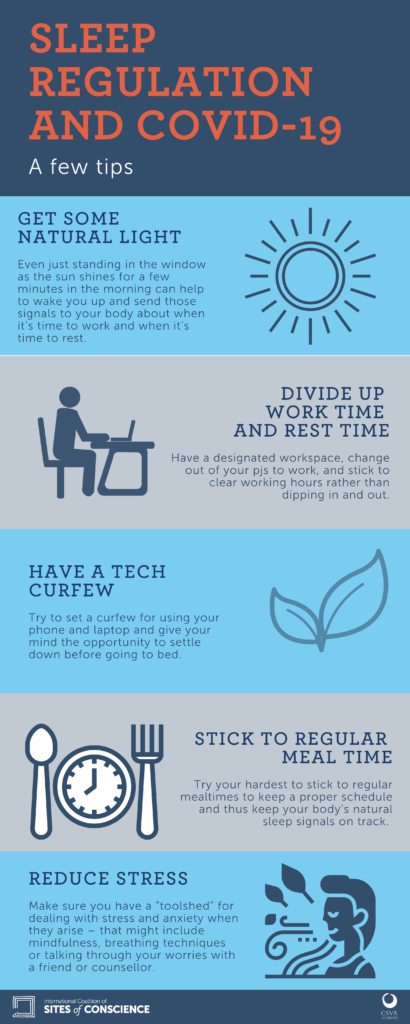[vc_row][vc_column][vc_column_text]
The information below is presented in collaboration with our GIJTR partner the Centre for the Study of Violence and Reconciliation in South Africa, who kindly supplied the material. For more information, visit them here.
Sleep Regulation During the COVID-19 Pandemic
There are many reasons you might be struggling with your sleep during the coronavirus pandemic and the resulting lockdown. A lack of exposure to natural light, a lack of physical activity, stress, the general fear that the world is ending and everything is awful – all that and more plays a role, making it harder to drift off, stay asleep, and get good quality sleep.
Even working from home can destabilize our sleep routine – especially if we work from our beds. The good news is that there are steps we can take to tackle all the fresh new sleep issues that have arisen during a lockdown.
- Get some natural light: Even just standing in the window as the sun shines for a few minutes in the morning can help to wake you up and send those signals to your body about when it’s time to work and when it’s time to rest.
- Divide up work time and rest time: when you’re working from home it’s hugely important to send signals to your brain to clearly demarcate when it’s time to work and when it’s time to rest. This is essential for boosting your productivity during the day and for making sure you can get to sleep at night. Have a designated workspace, change out of your pjs to work, and stick to clear working hours rather than dipping in and out.
- Have a tech curfew: In the evening we might be tempted to work late or keep watching our favourite TV show; this means we continue to expose ourselves to light and feed our mind with more information (exciting or scary, both are stimulating). To counter this and sleep well and feel refreshed, try to set a curfew for using your phone and laptop and give your mind the opportunity to settle down before going to bed.
- Stick to regular mealtime: You’re not alone if working from home has made you into an all-day snacking machine. Try your hardest to stick to regular mealtimes to keep a proper schedule and thus keep your body’s natural sleep signals on track. Being home might lead to more snacking on comfort foods (which have more sugar and are high in fat) and irregular meal-times. Caffeine and other stimulants affect your alertness and make falling asleep harder if consumed later in the day.
- Reduce stress: Stress and anxiety are major contributors to sleep issues, whether it’s making it impossible to drift off or causing you to toss and turn throughout the night. Make sure you have a toolkit for dealing with stress and anxiety when they arise – that might mean mindfulness, breathing techniques, or talking through your worries with a friend or counsellor. Making the effort to reach out and make contact using old and new formats – email, phone, chat apps and so on are all great ways to offset gloomy feelings.
It is totally normal to feel unsettled right now – this is a new situation for all of us and there’s no ‘right’ way to react. Do what you need to feel comfortable and get the rest you need. These are uncertain and stressful times, nobody exactly knows the immediate and distant future.
Most importantly be gentle and kind to yourself during these uncertain times. Check out this video for further tips to help you while you STAY AT HOME.
[/vc_column_text][/vc_column][/vc_row][vc_row][vc_column][vc_video link=”https://youtu.be/oWMp_nmiVGQ”][/vc_column][/vc_row][vc_row][vc_column][vc_column_text]
The information presented above was prepared in partnership with the Center for the Sudy of Violence and Reconciliation (CSVR), South Africa.[/vc_column_text][/vc_column][/vc_row]

